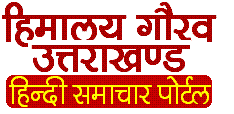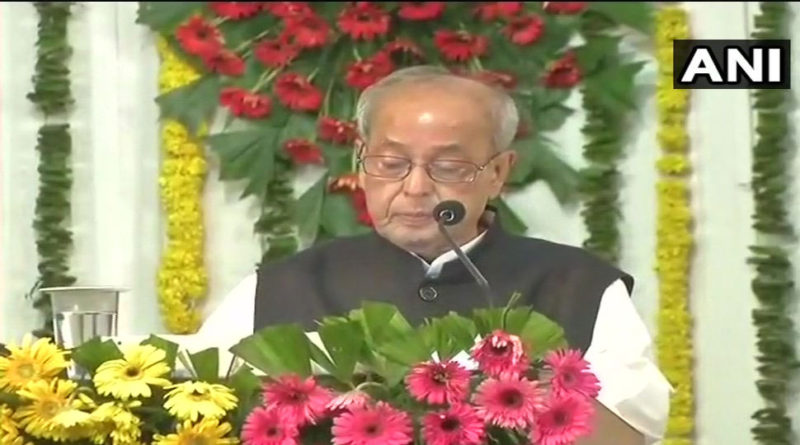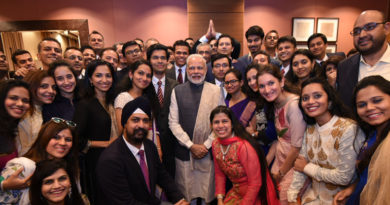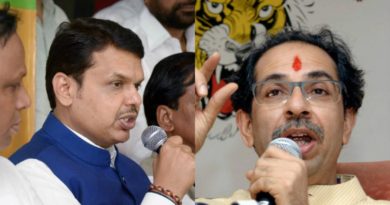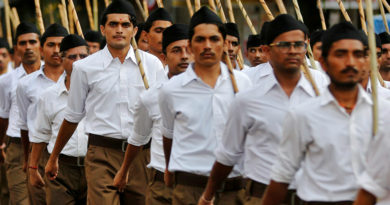जनता की खुशी में राजा की खुशी होनी चाहिएः प्रणव मुखर्जी नसीहत दे बैठे
जनता की खुशी में राजा की खुशी होनी चाहिएः प्रणव मुखर्जी : हर तरह की हिंसा से हमारे समाज को बचने की जरूरत, चाहे वह मौखिक हो या शारीरिकः प्रणव मुखर्जी #Former President Pranab Mukherjee on Thursday addressed the concluding ceremony of RSS’s Tritiya Varsh Training programme.
नागपुरः राष्ट्रीय स्वयं सेवक संघ (RSS) के दीक्षांत समारोह में शिरकत करने के लिए नागपुर पहुंचे पूर्व राष्ट्रपति प्रणब मुखर्जी गुरुवार शाम 5 बजे को संघ के संस्थापक डॉ. केशव बलिराम हेडगेवार के स्मृति स्थल पर पहुंचे. इस दौरान सरसंघचालक मोहन भागवत ने पूर्व राष्ट्रपति को फूलों का बुके भेंट कर स्वागत किया. इसके बाद पूर्व राष्ट्रपति ने हेडगेवार को श्रद्धाजंलि अर्पित की. बता दें कि आज (गुरुवार) पूर्व राष्ट्रपति आरएसएस के तृतीय वर्ष शिक्षा वर्ग के समापन समारोह के मौके पर कार्यकर्ताओं को संबोधित करेंगे. प्रणब मुखर्जी इस कार्यक्रम के मुख्य अतिथि हैं. आरएसएस के कार्यक्रम में पूर्व राष्ट्रपति प्रणब मुखर्जी के अलावा सुनील शास्त्री, संजयय लालभाई, चाल्ला राजेंद्र प्रसाद, राजीव मल्होत्रा, विशद मफतलाल, कल्याण चौबे, अर्धेंदु बोस समेत अन्य दिग्गज मौजूद हैं.
नागपुर में आरएसएस के संघ शिक्षा वर्ग (तृतीय वर्ष) के समापन समारोह में संघ प्रमुख मोहन भागवत ने कहा कि संघ को संपूर्ण समाज का संगठन करना है इसलिए संघ के लिए कोई पराया नहीं है। भागवत ने समापन समारोह में प्रणव मुखर्जी को आमंत्रित करने और प्रणव द्वारा निमंत्रण स्वीकार करने को ‘सहज भाव’ करार देते हुए इस पर होने वाली चर्चा को निरर्थक बताया। इस दौरान भागवत ने कार्यक्रम में आने के लिए प्रणव मुखर्जी को धन्यवाद भी दिया।
RSS के मंच पर बोले पूर्व राष्ट्रपति प्रणब मुखर्जी- मैं यहां देश और देशभक्ति समझाने आया हूं. मैं यहां देश की बात करने आया हूं. प्रणब मुखर्जी ने कहा भारत के दरवाजे सबके लिए खुले हैं, उन्होंने कहा कि, धर्म कभी भारत की पहचान नहीं बन सकता, नफरत से देश को सिर्फ नुकसान है। अगर हम भेदभाव-नफरत करेंगे तो हमारी पहचान को खतरा होगा। भारत दुनिया में सुख शान्ति चाहता है। उन्होंने कहा भारत पूरी दुनिया को परिवार मानता है। हिन्दुस्तान एक स्वतंत्र समाज है, भारत में विश्वविद्यालय की परंपरा बहुत पुरानी है। 1800 साल तक भारत शिक्षा का केंद्र था। दुनिया का सबसे पहला राज्य भारत है। भारत के दरवाजे सबके लिए खुले हैं।
नागपुर के रेशम बाग मैदान पर यह कार्यक्रम शाम 6.30 बजे शुरू हो चुका है. सूत्रों के हवाले से खबर है कि इस कार्यक्रम में अपने संबोधन के दौरान प्रणब मुखर्जी संघ को किसी भी तरह की कोई नसीहत नहीं दी ऐसा बताया जा रहा है कि प्रणब दा के भाषण में राष्ट्र, राष्ट्रीयता और देशप्रेम की जिक्र रहा-
आज पूरे देश की नज़र नागपुर स्थित राष्ट्रीय स्वयंसेवक संघ के मुख्यालय पर है. पूर्व राष्ट्रपति प्रणब मुखर्जी राष्ट्रीय स्वयंसेवक संघ के तृतीय वर्ष संघ शिक्षा वर्ग के समापन समारोह को संबोधित कर रहे हैं. पूर्व राष्ट्रपति प्रणब मुखर्जी ने कहा कि भारत दुनिया का पहला राज्य है और विविधतता हमारी सबसे बड़ी ताकत है.
अपने संबोधन में मोहन भागवत ने कहा, ‘हमने प्रणव मुखर्जी को सहज भाव से निमंत्रण दिया और उन्होंने सहज भाव से स्वीकृति दी। उनको क्यों बुलाया और वह कैसे जा रहे हैं, यह चर्चा निरर्थक है। संघ, संघ है और डॉ. प्रणव मुखर्जी, प्रणव मुखर्जी हैं।’ उन्होंने कहा कि संघ का कार्य भारत के लोगों का संगठन करना है ताकि भारत को परम वैभव तक पहुंचाया जा सके और पूरे विश्व में शांति का वातावरण बने, इसलिए संघ में सभी का स्वागत है। उन्होंने कहा, ‘हम सब एक हैं, पराया कोई नहीं, सबके पूर्वज एक ही हैं, सबके जीवन के ऊपर भारतीय संस्कृति का प्रभाव है।’ उन्होंने कहा कि दूसरों की विविधता को स्वीकार करके उसे सम्मान देते हुए एकता बनी रहे, यह बेहद जरूरी है। भागवत ने कहा, ‘स्वंतत्रता से पहले स्वतंत्रता के लिए प्रयास करने वाले सभी में मन में यह था कि देश की जनता को भी तैयार करना होगा। डॉ. हेडगेवार स्वतंत्रता के लिए किए गए कार्यों में रहे, कांग्रेस के कार्यकर्ता रहे, दो बार कारावास भुगता, क्रांतिकारियों के साथ रहे, संतजनों के साथ रहे।’ उन्होंने कहा कि आरएसएस लोकतांत्रिक विचारों वाला संगठन है और सभी के विचारों को स्वीकार करता है। भागवत ने कहा कि संघ को प्रसिद्धि की आवश्यकता नहीं है, आरएसएस समाज के उन लोगों को खोजने का काम करता है जो राष्ट्र के लिए अपना जीवन समर्पित कर सकें। आरएसएस चीफ ने कहा, ‘स्थापना के बाद विभिन्न दिक्कतों के बाद भी संघ आगे बढ़ता गया, अब संघ लोकप्रिय है। जहां जाते हैं, हमें स्नेह मिलता है।’ उन्होंने कहा कि आरएसएस देश की प्रगति के लिए काम करने पर ध्यान केंद्रित करता, अपनी मातृभूमि की पूजा करने के हर भारतीय का अधिकार है।’
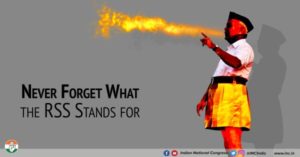 इस कार्यक्रम में करीब 707 स्वयंसेवक वहां पर मौजूद हैं. इस कार्यक्रम में मुख्य वक्ता के तौर पर संघ प्रमुख मोहन भागवत भी मौजूद हैं. इससे पहले बुधवार को जब प्रणब मुखर्जी नागपुर पहुंचे, तो राष्ट्रीय स्वयंसेवक संघ के सह सरकार्यवाह भैयाजी ने हवाई अड्डे पर उनका स्वागत किया. उनके साथ नागपुर महानगर संघचालक राजेशजी लोया और विदर्भ प्रांत के सह कार्यवाह अतुल मोघे भी उपस्थित थे.
इस कार्यक्रम में करीब 707 स्वयंसेवक वहां पर मौजूद हैं. इस कार्यक्रम में मुख्य वक्ता के तौर पर संघ प्रमुख मोहन भागवत भी मौजूद हैं. इससे पहले बुधवार को जब प्रणब मुखर्जी नागपुर पहुंचे, तो राष्ट्रीय स्वयंसेवक संघ के सह सरकार्यवाह भैयाजी ने हवाई अड्डे पर उनका स्वागत किया. उनके साथ नागपुर महानगर संघचालक राजेशजी लोया और विदर्भ प्रांत के सह कार्यवाह अतुल मोघे भी उपस्थित थे.
पूर्व राष्ट्रपति प्रणव मुखर्जी ने राष्ट्रीय स्वयं सेवक संघ (आरएसएस) कार्यक्रम में शामिल होकर कांग्रेस को असहज कर दिया है। कांग्रेस ने ट्वीट किया कि, सभी भारतीयों के लिए यह जानना जरूरी है कि आरएसएस ने ऐतिहासिक रूप से क्या खड़ा किया. भारत के लोगों को कभी नहीं भूलना चाहिए कि RSS की विचारधारा भारत के विचारधारा से उलट है.
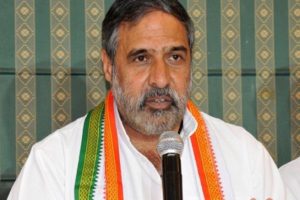 कांग्रेस प्रवक्ता आनंद शर्मा ने कहा कि पूर्व राष्ट्रपति ने संघ के कार्यक्रम में जाकर करोड़ों कार्यकर्ताओं को दुखी किया है। कांग्रेस ने अपने आधिकारिक ट्विटर एकाउंट से संघ पर हमला करते हुए कहा कि देशवासी आरएसएस का असली चेहरा न भूलें। पूर्व राष्ट्रपति प्रणब मुखर्जी नागपुर में आरएसएस मुख्यालय में एक कार्यक्रम को संबोधित कर रहे हैं। ये वो राजनीतिक घटनाक्रम है जिससे बीजेपी को नैतिक मजबूती मिलेगी और कांग्रेस की बेचैनी बढ सकती है। कांग्रेस ने कहा- आरएसएस कभी अंग्रेजों के खिलाफ स्वतंत्रता संग्राम का हिस्सा नहीं रहा. आरएसएस के संस्थापक केबी हेडगेवार को खिलाफत आंदोलन में उनकी भूमिका के लिए गिरफ्तार किया गया था और यह स्वतंत्रता आंदोलन में उनकी अंतिम भागीदारी थी. आरएसएस ने गांधी जी के नमक आंदोलन से भी किनारा किया था. आरएसएस हमेशा अंग्रेजों के अधीन रहा. संघ के द्वितीय सरसंघचालक माधव सदाशिव गोलवलकर ने भी उन आरएसएस के सदस्यों की आलोचना की थी जिन्होंने स्वतंत्रता आंदोलन में शामिल होने की इच्छा व्यक्त की थी. RSS ने कभी भी तिरंगे का सम्मान नहीं किया आरएसएस और नाथुरम गोडसे (महात्मा गांधी के हत्यारे) के बीच घनिष्ठ संबंध थे. गांधी जी की हत्या के बाद, आरएसएस के सदस्यों ने मिठाई वितरित की थी. ये भूलने वाला नहीं कि विनायक दामोदर सावरकर ने जेल में रहते हुए ब्रिटिश सरकार से कई बार माफी मांगी थी. भारतीय संविधान के लिए आरएसएस ने कभी भी ज्यादा सम्मान नहीं दिखाया, लेकिन वे मनुस्मृति का पक्ष लेते दिखाए देते हैं.
कांग्रेस प्रवक्ता आनंद शर्मा ने कहा कि पूर्व राष्ट्रपति ने संघ के कार्यक्रम में जाकर करोड़ों कार्यकर्ताओं को दुखी किया है। कांग्रेस ने अपने आधिकारिक ट्विटर एकाउंट से संघ पर हमला करते हुए कहा कि देशवासी आरएसएस का असली चेहरा न भूलें। पूर्व राष्ट्रपति प्रणब मुखर्जी नागपुर में आरएसएस मुख्यालय में एक कार्यक्रम को संबोधित कर रहे हैं। ये वो राजनीतिक घटनाक्रम है जिससे बीजेपी को नैतिक मजबूती मिलेगी और कांग्रेस की बेचैनी बढ सकती है। कांग्रेस ने कहा- आरएसएस कभी अंग्रेजों के खिलाफ स्वतंत्रता संग्राम का हिस्सा नहीं रहा. आरएसएस के संस्थापक केबी हेडगेवार को खिलाफत आंदोलन में उनकी भूमिका के लिए गिरफ्तार किया गया था और यह स्वतंत्रता आंदोलन में उनकी अंतिम भागीदारी थी. आरएसएस ने गांधी जी के नमक आंदोलन से भी किनारा किया था. आरएसएस हमेशा अंग्रेजों के अधीन रहा. संघ के द्वितीय सरसंघचालक माधव सदाशिव गोलवलकर ने भी उन आरएसएस के सदस्यों की आलोचना की थी जिन्होंने स्वतंत्रता आंदोलन में शामिल होने की इच्छा व्यक्त की थी. RSS ने कभी भी तिरंगे का सम्मान नहीं किया आरएसएस और नाथुरम गोडसे (महात्मा गांधी के हत्यारे) के बीच घनिष्ठ संबंध थे. गांधी जी की हत्या के बाद, आरएसएस के सदस्यों ने मिठाई वितरित की थी. ये भूलने वाला नहीं कि विनायक दामोदर सावरकर ने जेल में रहते हुए ब्रिटिश सरकार से कई बार माफी मांगी थी. भारतीय संविधान के लिए आरएसएस ने कभी भी ज्यादा सम्मान नहीं दिखाया, लेकिन वे मनुस्मृति का पक्ष लेते दिखाए देते हैं.
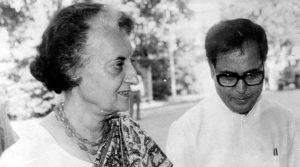 In what has caused quite a stir across the country, former President and stalwart of the Indian National Congress, Pranab Mukherjee, reached Nagpur on Wednesday to address an event organised by the Rashtriya Swayamsevak Sangh (RSS). Mukherjee’s decision has confounded leaders across the political spectrum, with some questioning his loyalty towards the party with which he was associated throughout his political career. There are others who are citing that Pranab’s participation in the RSS event would give credence and respectability to an organisation known to be intolerant towards constitutional ideals, particularly those of secularism.
In what has caused quite a stir across the country, former President and stalwart of the Indian National Congress, Pranab Mukherjee, reached Nagpur on Wednesday to address an event organised by the Rashtriya Swayamsevak Sangh (RSS). Mukherjee’s decision has confounded leaders across the political spectrum, with some questioning his loyalty towards the party with which he was associated throughout his political career. There are others who are citing that Pranab’s participation in the RSS event would give credence and respectability to an organisation known to be intolerant towards constitutional ideals, particularly those of secularism.
Mukherjee’s acceptance of the invite from Nagpur was followed by rumours of his daughter, Sharmistha Mukherjee (head of the women’s wing of Delhi Congress), quitting the Congress in favour of the BJP. Sharmistha on Thursday, however, strongly denied the rumours, stating that she was in politics because she believed in Congress. “Would rather leave politics than leave Congress,” she tweeted out.
Like Sharmistha, her father, too, has been a staunch Congress loyalist since days preceding the country’s Independence. In his book, “The dramatic decade: The Indira Gandhi years”, Mukherjee fondly reminisced about his childhood years when his family would hoist the Congress flag at their home every year on January 26. He wrote about how his family devotedly supported the Congress and spread its message of independence along the length and breadth of the country. “Father traveled from village to village, sharing meals with the locals and preaching the Congress ideology,” he wrote. Mukherjee began his political career in 1969 when Indira Gandhi, on recognising his acumen, made him a member of the Congress. Soon after he became a member of the Rajya Sabha and in the ensuing years, swiftly rose up the political ladder under the tutelage of Gandhi. However, in the years following the assassination of Gandhi, Mukherjee, though still steadfastly loyal to the Congress, slipped into an uneasy relationship with the party.
At the end of October in 1984, Mukherjee and Rajiv Gandhi were touring West Bengal when they received the message about Indira Gandhi’s assassination. In an autobiographical account in his book, “The turbulent years: 1980-1996”, Mukherjee recalled the moment when they received the news. “Tears started rolling down my face, and I wept inconsolably, managing to compose myself only after some time and with great effort,” he wrote. After all, it was under the guidance of the Indira Gandhi that Mukherjee had enriched his political knowledge and attained great heights in his career.
It was not without reason that Mukherjee was frequently referred by her as the ‘man for all seasons.’ In 1978 when the Congress split, he was one of the few who stood strongly beside Gandhi. He recalled in his book his father’s advice to him to stand by her. “He told me: ‘I hope you will not do anything that will make me ashamed of you. It is when you stand by a person in his or her hour of crisis that you reveal your own humanity,’” he wrote, adding that “his meaning was clear, and I didn’t then or later waver from my loyalty to Indira Gandhi”. He stood by her, supporting every move of hers when she was being criticised for declaring Emergency and was also there to share the blame after the Emergency was lifted.
When Gandhi suddenly died in 1984, many thought Mukherjee would be the one to fill in her shoes. On previous such instances, like after the death of Nehru in 1964 and that of Shastri in 1966, following parliamentary customs, a ranking member of Parliament was called upon by the President to take over the prime ministerial position. It was expected that President Zail Singh, in keeping with the tradition, would have called Mukherjee, who was then the Finance Minister, to take on the role of acting prime minister. However, that was not to be.
Mukherjee, in his book, wrote that in earlier instances when a prime minister passed away, the death was natural. This case was an extraordinary situation since the incumbent prime minister had been assassinated, and not only was a political void created, but also there were a large number of uncertainties around the incident. In such an atmosphere, while still on his way back to Delhi from West Bengal, he along with other Congress members with him, decided that it was necessary that Indira’s son Rajiv Gandhi take the prime ministerial reign. But the matter had been settled in Delhi itself even before they landed. Minister of Fertilizers Vasant Sathe reportedly took the lead in arguing for Rajiv’s election.
A few months later, however, Mukherjee would receive his strongest blow. In the parliamentary elections that were held in December 1984, Congress emerged victorious with a massive 414 seats in its kitty. When Rajiv Gandhi announced his new cabinet, it was the absence of Pranab Mukherjee’s name that was most conspicuous. “When I learned of my ouster from the Cabinet, I was shell-shocked and flabbergasted. I could not believe it. But I composed myself and sat alongside my wife as she watched the swearing-in ceremony on television,” he wrote.
After being ousted from Parliament, Mukherjee founded the Rashtriya Samajwadi Congress (RSC) in West Bengal in 1986. Three years later, however, it merged with the Congress after reaching a compromise with Rajiv Gandhi. In 1991, the country witnessed yet another assassination. This time it was Rajiv Gandhi’s. After his death, however, Mukherjee’s career is known to have gone through a revival of sorts. Under the then Prime Minister Narasimha Rao, Mukherjee was appointed the deputy chairman of the Indian planning commission and subsequently, in 1995 he became the External Affairs minister.
After the death of Rajiv Gandhi, his wife Sonia Gandhi was asked to take on the prime ministerial role. However, she refused, exhibiting consistent reluctance to enter politics for a long time thereafter. It was only in 1997 that she joined the party as a primary member in the Calcutta plenary session and later became a party leader in 1998. Days later, she was offered the party president post, which she accepted. Reportedly, Pranab Mukherjee was one of the strongest architects of her ascendancy to the post of party president.
It is believed that Mukherjee played a key role in educating Sonia, mentoring her to tackle situations the way her mother-in-law had once done.
After the 2004 elections, when the Congress was elected to return to power, Sonia Gandhi was an obvious choice of the party for the post of prime minister. However, in the midst of severe criticism against her taking control of the government on the ground of her being of foreign descent, she declined the prime ministership. There was much anticipation then of Mukherjee being offered the prime ministerial position. He too would appear to have anticipated the same. “The prevalent expectation was that I would be the next choice for prime minister after Sonia Gandhi declined. This expectation was possibly based on the fact that I had extensive experience in government, while Singh’s vast experience was as a civil servant with five years as a reformist finance minister,” he wrote in an account in his book ‘The coalition years (1996-2012)’.
However, it was Manmohan Singh who emerged as Gandhi’s choice for prime minister, taking away yet another opportunity from Mukherjee to accede to the topmost government position. In 2012, after more than four decades of active work in the Indian political landscape, he was elected as the 13th President of the country. Many believe Mukherjee’s elevation as President was a compensation made by the Congress for passing him over for the prime minister’s post a number of times.
